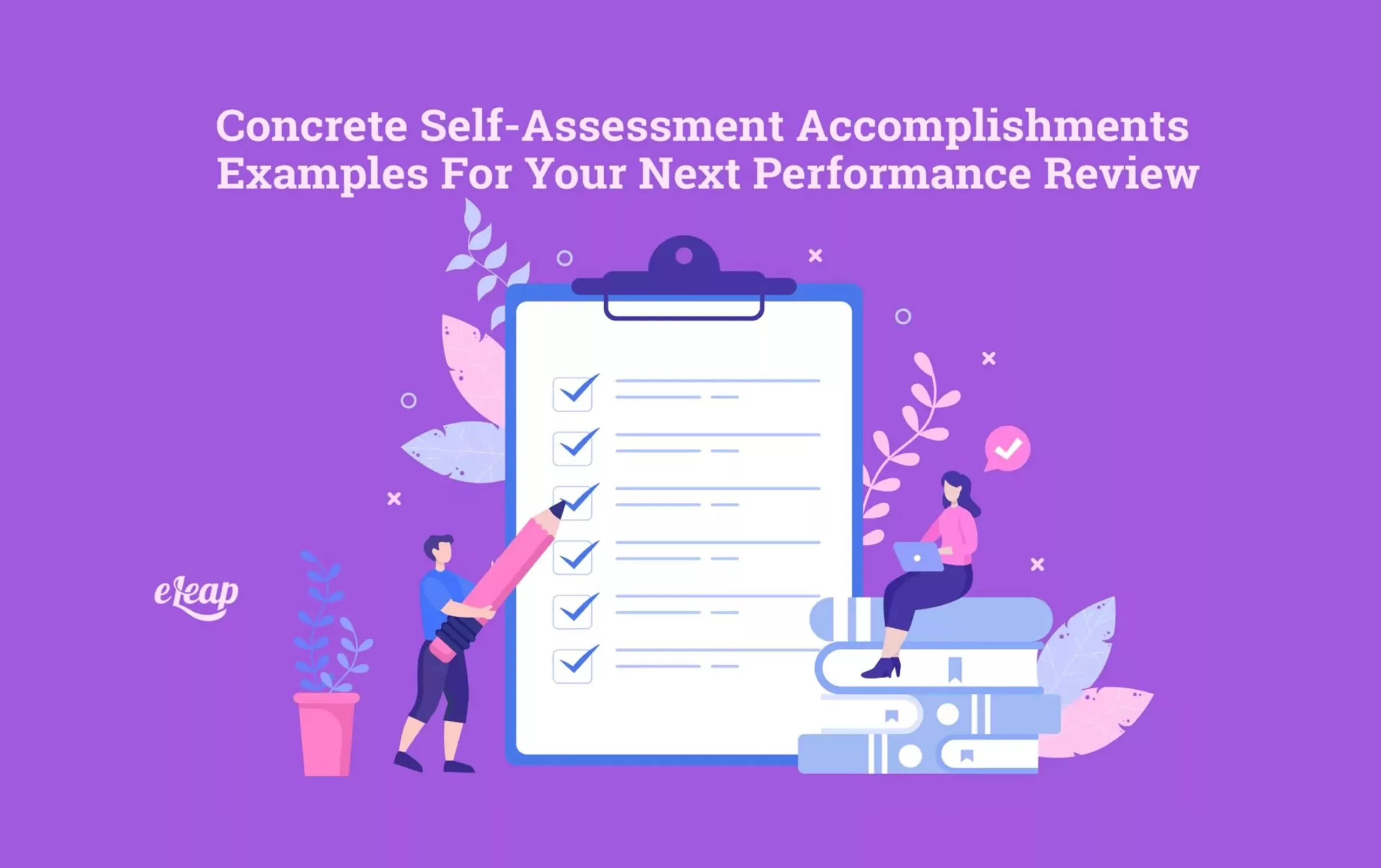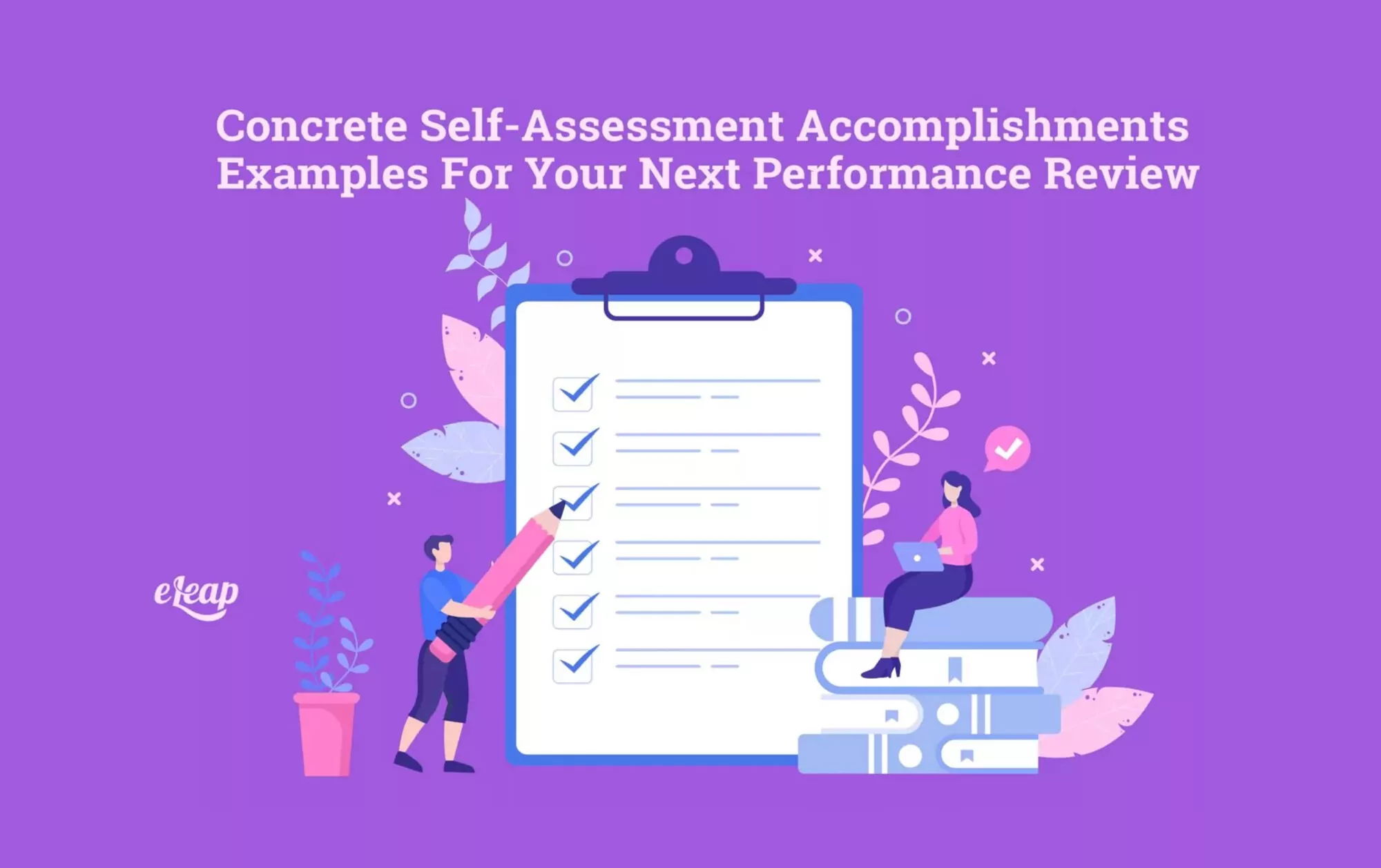Concrete Self-Assessment Accomplishments Examples for Your Next Performance Review

Using accurate, positive Self-Assessment accomplishments examples that clearly show your management team why you are a valued asset is no small task. To do this, you not only have to have a true picture of yourself as an employee and team member but also an idea of what your leadership is looking to hear.
Annual performance reviews and the self-assessment accomplishments that each employee is expected to bring to the discussion are beneficial for both the employee and the manager. These self-assessment examples are an opportunity for the team member to showcase their strengths and successes and to use those as leverage for a promotion, a raise, or more flexibility in their work. eLeaP has powerful tools and resources to ensure you have success when it comes to reviews and self-assessments.

They are also a way for the management to get a view of what each person who works for them is doing individually and how they all work together as a unit—managers can’t be expected to watch everyone’s moves all day every day, especially if they oversee hundreds of people.
You may not have looked forward to writing your self-assessments in the past; with the tools presented here, though, you’ll have plenty to go on so that you don’t feel writer’s block before you even start. Remember, too, that your manager is dedicating quite a bit of time to conducting these annual reviews with each employee whom they oversee.
Since they are carving out days or even weeks to conduct these meetings, they place great importance on them. When you show up well-prepared, having thought about what you want to say, you demonstrate that the meeting is important to you, too, and that you value your boss’s input. Those set you up for success no matter what.
Topics for Self-Assessment Accomplishments Examples
A strong, well-written self-assessment should almost always consist of a few key areas. No matter what your job is or what your company does overall, your self-assessment will be beneficial to both you and your superior when you can discuss the feedback that they have given you previously, list out and talk about your accomplishments (with metrics and data, where appropriate), and identify areas for growth.
- Feedback – Your boss doesn’t take the time to meet with each employee only to have them walk out of their office and forget everything that was said. Take their constructive criticism as well as their positive acknowledgments to heart, and then put that feedback into place. If you have a hard time remembering these types of information over time, keep a notebook or running document in which you can track feedback (concrete or passing) throughout the year. Then, when it’s time for your next review, you can specifically show your boss where you’ve taken their directives.
- Note Successes – This isn’t the time for pretending that you don’t need recognition—that’s what you’re there for! Keep a list of all your successes throughout the year so that you can easily show how you have been of value to your company over the entire time since your last review. You don’t need to be boastful or try to throw others under the bus, but you should be proud of the work that you’ve put in every day. Make these successes specific—not only will you be able to elaborate on them more in-depth, but your boss will also remember specific successes better than you simply saying, “I did well in this area.”
- Hard Data – Numbers are impactful. It’s easy to say that you have helped improve company success, brought in more clients than other people, or closed more deals than you did last year, but without the proof, that could just be you saying something that you think will sound good—especially if your boss isn’t close enough to see your successes firsthand.
- Identify Areas of Growth – Self-assessments aren’t just about showing your boss what you’ve accomplished. Leaders also want to know that their employees are continually working to improve themselves and that they want to continue improving the company through that individual growth. This isn’t meant to be self-deprecating, though. Instead, choose one or two areas where you might have fallen short of past goals and bring in some ideas where your boss could support you in reaching them. Alternatively, you could recognize strengths in others and communicate how you would like to gain some of their knowledge or experience through collaboration.
Areas to Notate on Your Self-Assessment
Companies of all types, sizes, and industries ask their employees to write self-assessments with examples so that they can conduct annual reviews which bring about improvement and company success. Whether you are in the business of financial planning, entertainment, education, agriculture, or any other of the myriad jobs that keep our world turning, you should be able to assess your employment performance in each of these areas.
Remember that for each of these, you’ll want to take the idea that sticks out to you and connect it with a specific example that you can elaborate on without fillers. Your boss will be able to remember these specifics and use them in future decisions that could improve your status (or salary) with the company.
Communication and Collaboration
Whether you are a team leader or still on one of the bottom rungs of the company ladder, communication is a critical skill for working well with others. If you’re a leader, do you delegate well and clearly communicate your expectations? Can you provide encouragement as well as criticism with honesty and sensitivity? If you are often taking direction from others, are you proactive in getting your questions answered, and do you choose a positive attitude no matter what the task at hand?
Job Performance
At any level of employment, it’s crucial that a person take pride in their job. Are you someone who does the bare minimum to get by, or do you often take the opportunity to help others with their projects and obtain more responsibility? Have you exceeded specific gals and/or lowered company costs? How do you react when others ask you about your successes; are you willing to help others succeed and to take on challenges?
Reliability and Accountability
Any manager wants an employee who is going to show up when they say they will and do what they say they’re going to do. In this area, you can specify how you have come to work without having to miss ‘x’ number of allotted sick days, or how you have never missed a deadline. Are you mindful of your schedule as well as those of your colleagues? For example, do you put in your scheduled time off ahead of time, do you respond to emails well before the requested timeframe, and do you use your time effectively so others aren’t inconvenienced?
Customer or Client Focus
The client is always right, but that doesn’t mean that handling them is always easy. It’s the mark of a valued employee when you can handle conflict or work through a unique customer situation with grace and tact. Do you go above and beyond to help clients have a positive experience? How do you reflect on your own customer experiences to understand where your clients are coming from?
Creativity and Innovation
The most successful business have one thing in common—they aren’t stagnant. They are always improving and growing, although they see what is working well and build on that instead of reinventing the wheel. How do you respond to challenges and use collaboration to bring fresh, new ideas to the table that can be implemented efficiently? Do you work well with perspectives that are different from your own so that everyone can share in the success or do you have some room to grow in accepting other people’s opinions?
Improvement and Development
Even the best business can’t grow and stay ahead of the power curve if all of their team members are complacent. Do you look at yourself and note your personal areas for improvement before critiquing others? Are you a model for your team instead of someone who puts themselves on a pedestal? When change is imminent, are you flexible and resilient or do you resist change and put up a fight? Find the places where you are open to learning and use them to your benefit.
Response to Feedback
This might be the most difficult area, yet it’s one of the most important. What are the areas in which you might think you excel but others note that you could work a little harder, more efficiently, or communicate more effectively? If you work well in small groups, is your teaching and guidance still well received when you are instructing a larger team? Do you think of others so much that you forget to value your own needs (or vice versa)?
Conclusion
An easy way to remember these points is to think: “What should I keep doing? What should I stop doing? What should I start doing?” If you can address each of these areas, you’ll be setting yourself up for a successful annual review with a well-thought-out self-assessment.